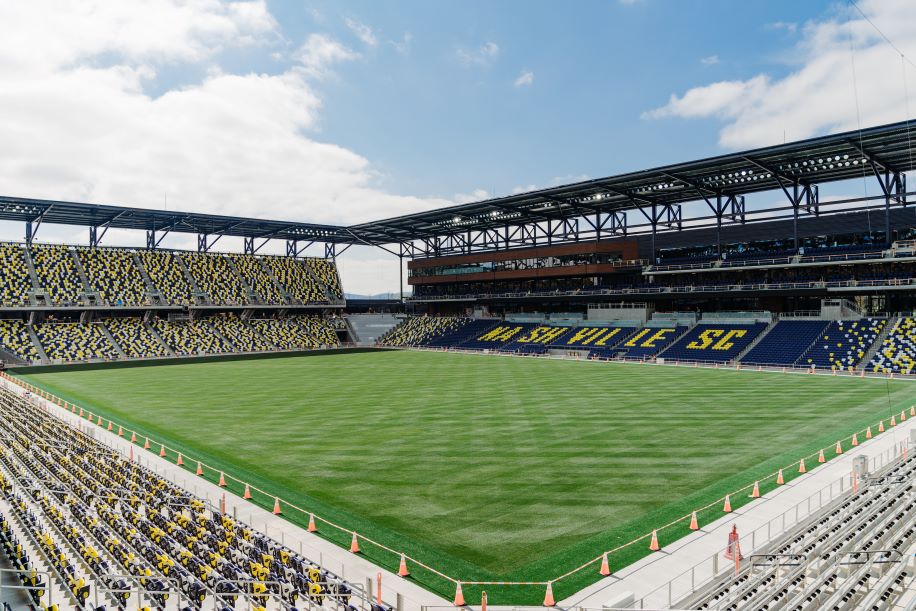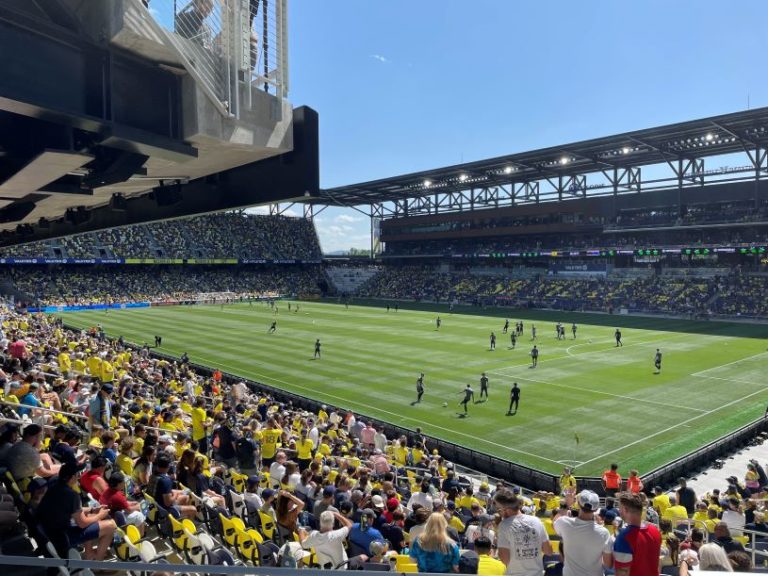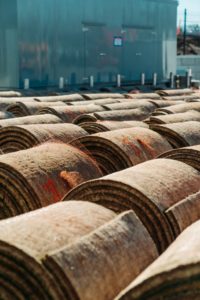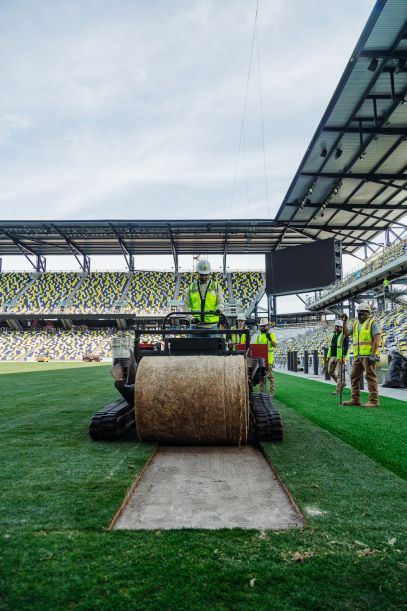Most people take old desk supplies or some new ideas with them from one job to the next. But Nashville Soccer Club (SC) Groundskeeper Adam Portenier took much more when he left FC Dallas in September 2019.
Portenier, who’d been at FC Dallas for five years brought his love for a turfgrass variety from one Major League Soccer (MLS) stadium to another. Both teams play on Latitude 36 bermudagrass, a fine-textured and cold-hardy bermudagrass developed by Oklahoma State University.
“Actually, at FC Dallas, we tore out 419 and put Latitude 36 Bermudagrass in during my first week. So, I got to get hands-on experience with it at Dallas, which is one of the busiest fields in the U.S.,” said Portenier. During his time there, in addition to the MLS schedule, Toyota Stadium also hosted three to four concerts per year, 15 to 19 high school football games each fall, the Frisco Bowl, the FCS Championship game, and 22 to 25 high school soccer matches in the winter.
“After going through that schedule with that grass, and some years we didn’t have to re-sod at all, I knew this was a grass that would be able to handle the workload here. It’s kind of the same setup,” Portenier said. “The maintenance plan and cultural practice that Allen Reed set up there (Dallas FC) and that I learned under, we were pretty much able to get through anything and everything that they threw at us.”
Before he worked in soccer, Portenier worked in baseball at Haymarket Park where the Nebraska Cornhuskers and a semi-pro team played. From there he worked for the Texas Rangers, which led him to a position at Dallas FC.
“I really didn’t know much about soccer at all, I was just looking for a change of scenery and to move up in my profession.” He also said he was fortunate for the referrals that helped him get his position in the MLS and enjoys the sport now that he’s learned more about soccer.
Nashville SC has created a buzz among sports fans in Tennessee. Bringing an MLS team within five minutes of downtown is new and exciting. This season, they opened the largest soccer-specific stadium in the United States and Canada with 30,000 seats. They played their first two seasons in the league at nearby Nissan Stadium.
Their new stadium, recently named GEODIS Park, overlooks the historic Nashville Fairgrounds. Portenier explained that, due to its location, the stadium had a six-month delay in the opening, but the ownership pushed through, and the team held its first home game in May 2022. The stadium was privately funded by owner John Ingram, a businessman and philanthropist. GEODIS Park features a 360-degree canopy roof, lower, mid and upper-level seating, club seating areas on the main concourse, club and press seating on the top level as well as suites on the west side of the stadium.
“It’s a massive stadium, but once you’re in there it’s very intimate, it’s a very steep stadium. The farthest seats from the touchline are only 150 feet,” Portenier said.
According to Portenier, there were a lot of eyes on his team during the season home opener this spring with 30,000 fans attending and high expectations coming in.
“I have very high expectations for the facilities and fields I manage,” he said. “As soccer keeps getting bigger and bigger, there are so many good turf managers in this league and the standards get raised year in and year out. We’re all very proud of our work, we take our work seriously and keep pushing each other to meet those expectations and pressures to keep up with the league.
“We’ve definitely come in and made our mark in the city where we’re starting to compete with the Titans and Predators as we’ve already sold over 20,000 season tickets. So, the energy and excitement has grown in the first three years, and a lot of people in this town are behind us,” he added.
Turfgrass selection
Nashville FC used Sod Solutions Professionals from the early stages of planning the pitch for the new stadium. They first considered using other turfgrass varieties they had on in the team’s temporary training facility.
“But overall, I went through with what I was comfortable with and what we’d had great success within Dallas,” said Portenier. “I didn’t see the need to change from a grass that has been proven day-to-day.”
According to Portenier, he knew that the quick recovery of Latitude 36 was one reason he wanted it in Nashville.
“It’s just a very aggressive grass. It has a good color, which is not the most important thing, but aesthetics usually have a big factor for people above me that look at the field. The ability to handle wear was my highest priority,” he said. “Stadiums aren’t slowing down. They’re just getting busier and busier with events, whether it’s soccer or concerts and I’m sure down the road we’ll host football games after the season.”
Just before the season started, while it was overseeded with ryegrass, Portenier adjusted the mowing heights to get the grass low and tight, to ensure fast playability. “Every player has been really impressed with how the ball rolled, the smoothness of it and the consistency of the pitch. So far everybody’s very impressed with this field,” he said. “Precision Turf who built this and grew the grass did a phenomenal job. Then we’ve taken over and really dialed it in and we’ve gotten nothing but compliments on it.”
According to Portenier, they did everything in-house and didn’t contract out the subgrade drainage, the root zone irrigation or any of the work. “It was a very good experience and after that they’ve actually started to build our training fields. It’ll be two full-size fields with a goal area and then one artificial field. One thing about Precision Turf is every guy that works out there has a turf background and has come from some kind of management of a facility, so they know not only how to build fields, but they know how to manage them and are really good throughout the whole process at finding things and offering suggestions,” he said.
Portenier first visited Atlanta-based Precision Farms in May 2020 with representatives from Mortenson, the head superintendent building the stadium, as well as with the turf consultant, Dr. John Trey Rogers from Michigan State. They walked a field of Latitude 36 that had just been harvested and was starting to regenerate.
“We actually ended up selecting that plot because we had time for that to mature because we knew we weren’t going to harvest this until 2021,” he said. “Latitude is a very aggressive grass, so we were going to limit our patch that we brought from the field to the sod on plastic. Then we top-dressed the field-grown sod with our sand spec so when we cut it out, we were bringing all compatible materials to the sod on plastic.”
According to Portenier, when the grass arrived from Georgia, it was in phenomenal condition. Within two weeks, they were pushing 4.5-5-inch roots.

Natural grass for MLS
“My opinion is there shouldn’t be artificial grass in professional sports,” said Portenier. “I think we have the technology now with grow lights, with data we’re pulling to grow grass if the climate and zone is right. It’s always worth trying to go grass first and push through because in my opinion even a grass field that maybe not be 100% is still safer than an artificial field.”
Portenier said he is eager for the FIFA break when they will dive in, pull cores, verticut, drop the height and focus on the look of field. “I just love the look of a full bermudagrass field and how low and tight you can get it. It’s just a phenomenal grass.”
* Note: In addition to Dallas FC and Nashville SC, Orlando City SC, Inter Miami CF and Los Angeles FC all use Latitude 36.



